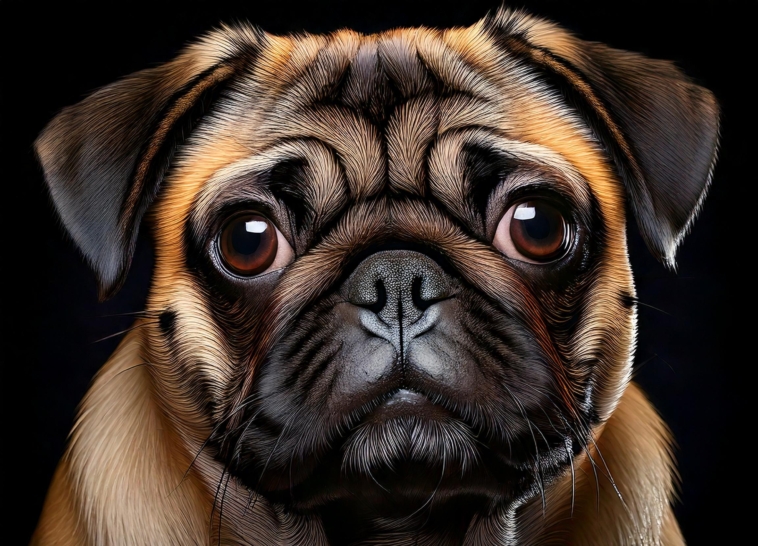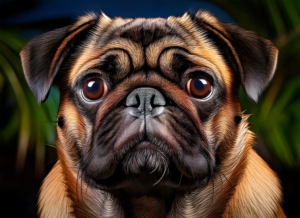Brindle Pugs: Stripes, Squish, and Royal Sass
The Origin Story (No Capes, Just Coats)
Brindle Pugs did not emerge from the dog factory with stripes. They’re a peculiar deviation of the regular pug, but with a key difference: they resemble someone dumping a pug into a tiger stripe bowl. The design? An elegant genetic mashup.
They immigrated to Europe in the 16th century through trade routes—most likely riding in comfort, snoring their way there. When they got there, it wasn’t long before Holland and England royalty were saying, “Yes, I’ll have 10 of these flat-faced fashionistas.”
The brindle coat pattern is actually a genetic roll of the dice—but to the rest of us, it merely appears as though a pug decided to don pinstripe pajamas.
What’s With the Stripes?
Brindle Pugs are not your typical tan or black pugs. They have that “I woke up like this” brindle pattern that goes from almost non-existent streaks to in-your-face stripes. Imagine zebra meets bulldog with a snort on the side.
Brindle Variations:
- Standard Brindle: Light and dark stripes hanging out loose style on the body.
- Tiger Brindle: More dramatic, like your pug just stepped off a jungle cat runway.
- Reverse Brindle: The stripes are undercover—light designs on a dark coat. Extremely “mysterious stranger at the party” vibes.
They are a cinch to groom. A brush here, a scratch there, and boom—showroom ready.
Health and Lifespan: Pug Maintenance 101
As with all pugs, the brindle crew typically live between 12–15 years, provided they don’t talk you into double dinners nightly.
Typical Health Plot Twists:
- Hip Dysplasia: Hips don’t lie, but occasionally they grumble.
- Skin Problems: Wrinkles are adorable—until they get grumpy. Clean ’em often.
- Obesity: They adore food. You adore them. Sadly, so does fat.
Pro tip: Don’t miss those vet visits. Even though your pug will probably give you the betrayed look that says, “Why would you do this to me?
Brindle Pug Dining Guide: Small Plate, Big Flavor
Feeding a brindle pug isn’t brain surgery, but it does involve label reading and a little self-control (yours, not theirs).
- High-Quality Kibble: Select food designed for small breeds. No bargain bin chow.
- Protein: They might look like marshmallows but require muscle as well.
- Good Fats: For that shiny, red-carpet coat.
- Vitamins: A, E, B-complex. Essentially the doggie multivitamin section.
- Portion Control: If they behave as though they’re starving, they’re lying. Follow the plan.
Grooming Tips: How to Keep Your Pug Fancy
- Baths: Monthly, unless they’ve rolled in something “mysterious.”
- Ears: Clean often. Stinky ears = unhappy vet bills.
- Teeth: Yes, you need to brush them. No, they won’t adore it.
- Brushing: It’s bonding time. And less hair on your couch.
Exercise: Small Dog, Big Zoomies
Pugs don’t appear to be built for Netflix and snack time, but they do enjoy playtime. Just keep it light after all, they have flat faces and limited airflow.
Fun Things to Burn Off Energy (Theirs, Not Yours):
- Tug-of-war (occasionally let them win).
- Short walks (not long-distance runs).
- Hide-and-seek with treats (pug version of treasure hunt).
- Strictly NO hot weather marathons. These dogs overheat quicker than your phone in the sun.
Getting Along with Roommates (Kids, Cats, Chaos)
Brindle Pugs = the best family floof. Wonderful with children, other pets, and sometimes cats (if the cat is cool with it).
Tips for Harmony:
- Early Socialization: Get them used to your zoo early.
- Supervise Playtime: Particularly with toddlers who believe dogs are teddy bears with a pulse.
- Basic Training: Sit. Stay. Don’t eat the baby’s socks.
Fun with a Brindle Pug: It’s a Lifestyle
Need some bonding activities? Here’s your pug’s ideal day:
- Walks & Simple Hikes: “Stroll” instead of “survival test.”
- Agility Games: They’ll do it. Just not fast.
- Puzzle Toys: Challenge their brain. or at least hinder their snack-grabbing speed.
- Playdates: Yes, pugs have a social life.
- Training Sessions: Treats masquerading as lessons.
Brindle Pug Myths (And Other Silly Rumors)
- They’re not a different breed.
They’re not rare unicorns (but don’t tell them that).
And no, the stripes don’t come off in the wash.
Adopting a Brindle Pug: Rescue Edition
If you’re welcoming home a rescue brindle pug, here’s the game plan:
- Find a Legit Rescue: Ask around, read reviews. No sketchy Craigslist ads.
- Know the Coat: It’s cute, but needs grooming.
- Prep the House: Hide wires, block stairs, put out the comfiest dog bed money can buy.
- Vet Visit ASAP: New dog, new health check.
- Training Help: Classes = good. Chaos = bad.
Picking a Good Breeder: No Backyard Deals
If you’re purchasing from a breeder, do your research.
- Read Reviews: And not only on social media.
- Health Testing: Demand proof. Not amorphous “they’re healthy” statements.
- Ask Questions: If they don’t know pugs backwards and forwards, keep swiping.
- Breeding Ethics: No puppy mills. No apologies. That’s enough said.
Traveling with Your Brindle Buddy
Planning a pug-cation? Excellent! Just do it the right way:
- Kennel Training: So they don’t go ballistic in a crate.
- Essentials Bag: Food, medication, toys, blanket—yes, like bringing diapers for a toddler.
- Pit Stops: Every few hours. Nobody enjoys holding it in for 300 miles.
And never forget: flat-faced dogs + hot cars = absolutely not.
Conclusion: Should You Get a Brindle Pug?
If you desire:
- A small friend with a big attitude.
- A dog that appears to have escaped from a comic book.
- A pet that snores more loudly than your uncle.
- And a best buddy with designer stripes.
Then yes. You’re 100% ready for a brindle pug.





